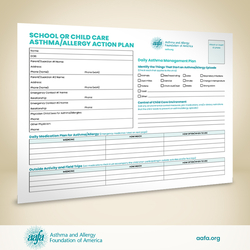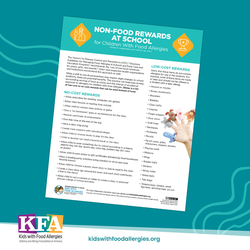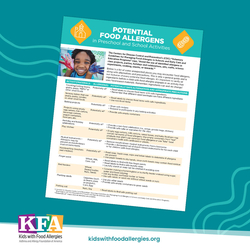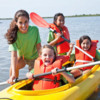Summer camps can be great places that help your child build self-esteem and self-confidence, make friends, and work on social skills. When your child has a food allergy, working with the staff and preparing in advance is key to helping your child focus on these skills while staying safe.
Here are some ways you can work with camp staff to be prepared to manage your child’s food allergy.
1. Think about the camp’s challenges and needs.
Consider what type of camp your child will attend. They can range from day camp (half to full day) to overnight camp. Some last all summer, while others offer week-long sessions. Some staff members are local, while others travel from different states or countries.
Every camp is different. Think about the type of camp you will send your child to and how their food allergy may be handled. Some camps are spread out over acres of property which might make them far from area hospitals. Rural camps could have areas with no or limited cell phone coverage. Staff may plan field trips outside of camp for a day or a week.
Think about all of these factors while you’re preparing and working with camp staff to put together a plan for managing your child’s food allergy.
2. Talk with camp staff about how they manage food allergies.
Before your child leaves for camp, talk with camp staff to find out how they handle food allergies. Proper planning and staff training are critical. If possible, meet with the camp director, camp nurse, and food services director.
When you talk to the camp staff, ask the following questions:
- What are the camp’s food allergy policies?
- Will all staff follow the policies at all times in all settings?
- Are health care staff at the camp at all times?
- Are all staff trained regularly on managing food allergies, treating allergic reactions, and giving epinephrine?
- Will they make every effort to include your child in all activities?
- Is the dietary staff trained on reading labels, avoiding cross-contact, and preparing safe food?
- Where will epinephrine be kept? Will it be protected from the heat when outside?
- How does the camp prevent and handle food allergy bullying?
Are local summer camps and programs required to accommodate my child with food allergies?
In many cases, the answer is yes! Under the Americans with Disabilities Act (ADA), public programs must accommodate your child’s food allergies as long as it does not:
- Create an undue burden for the camp
- Fundamentally change the way the camp operates
3. Work with staff to create a plan to prevent and treat allergic reactions.
Your child should have an individual health care plan for camp. This is a type of nursing care plan. This will be similar to a school health care plan. It outlines what the camp will do to create and maintain a safe environment for your child.
This health care plan should also include an allergy action plan. This lists symptoms staff should look for and when and how they should treat an allergic reaction.
Work with your child’s allergist to fill out our School or Child Care Asthma/Allergy Action Plan. Or the camp may already have health care plan forms for you to fill out. Give copies to the camp and ask to review them with the camp nurse before camp starts.
Ask the staff about how they deal with allergic reactions if they do happen. Let them know epinephrine should go with your child everywhere.
4. Share additional resources with camp staff.
Consider sharing additional educational resources with the camp director or nurse to help with camp-wide awareness.
- If your child is allergic to any of the most common food allergens, you can share our food allergy guides for your child’s allergen with the staff.
- Make sure staff are aware food can be found in unexpected places too. Share helpful resources from Kids with Food Allergies (KFA), such as our Non-Food Rewards for Children with Food Allergies handout and our Potential Food Allergens in Preschool and School Activities handout with camp staff.
Get answers about managing your child's food allergies on our online forums.
GET SUPPORT NOW







Comments (0)